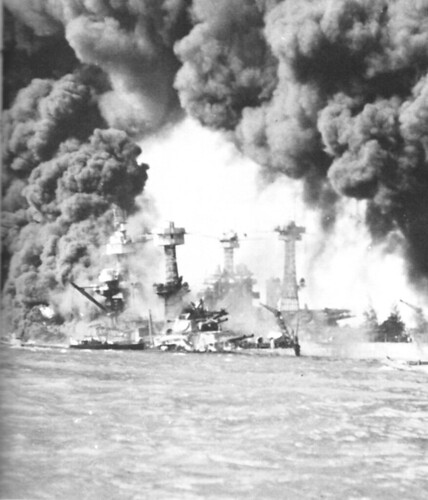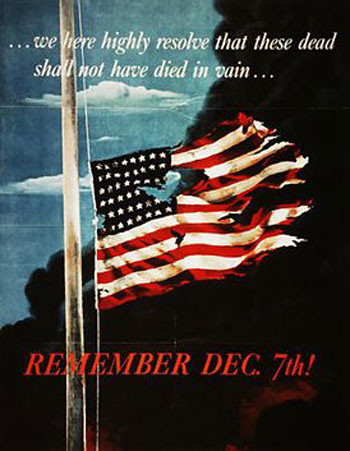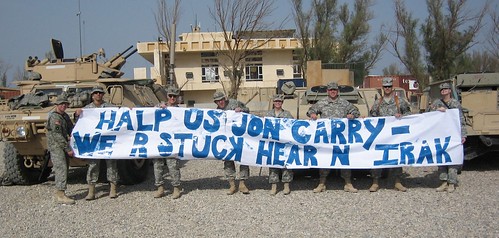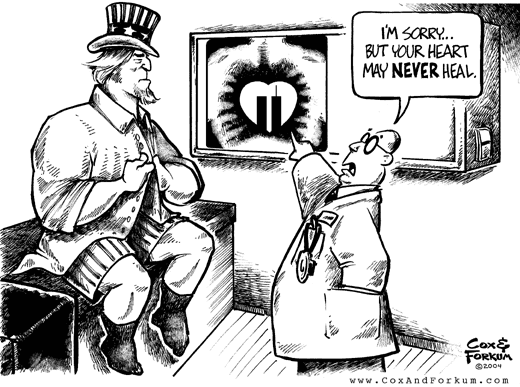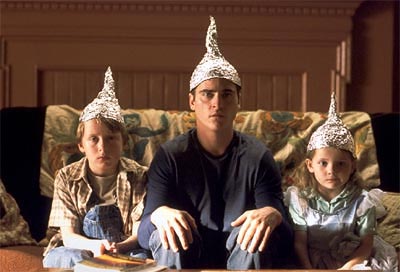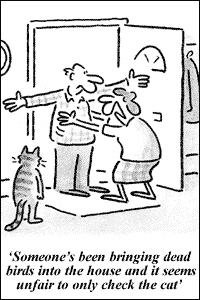Losing the Enlightenment
A civilization that has lost confidence in itself cannot confront the Islamists.
BY VICTOR DAVIS HANSON
Wednesday, November 29, 2006 12:01 a.m. EST
Our current crisis is not yet a catastrophe, but a real loss of confidence of the spirit. The hard-won effort of the Western Enlightenment of some 2,500 years that, along with Judeo-Christian benevolence, is the foundation of our material progress, common decency, and scientific excellence, is at risk in this new millennium.
But our newest foes of Reason are not the enraged Athenian democrats who tried and executed Socrates. And they are not the Christian zealots of the medieval church who persecuted philosophers of heliocentricity. Nor are they Nazis who burned books and turned Western science against its own to murder millions en masse.
No, the culprits are now more often us. In the most affluent, and leisured age in the history of Western civilization--never more powerful in its military reach, never more prosperous in our material bounty--we have become complacent, and then scared of the most recent face of barbarism from the primordial extremists of the Middle East.
What would a beleaguered Socrates, a Galileo, a Descartes, or Locke believe, for example, of the moral paralysis in Europe? Was all their bold and courageous thinking--won at such a great personal cost--to allow their successors a cheap surrender to religious fanaticism and the megaphones of state-sponsored fascism?
Just imagine in our present year, 2006: plan an opera in today's Germany, and then shut it down. Again, this surrender was not done last month by the Nazis, the Communists, or kings, but by the producers themselves in simple fear of Islamic fanatics who objected to purported bad taste. Or write a novel deemed unflattering to the Prophet Mohammed. That is what did Salman Rushdie did, and for his daring, he faced years of solitude, ostracism, and death threats--and in the heart of Europe no less. Or compose a documentary film, as did the often obnoxious Theo Van Gogh, and you may well have your throat cut in "liberal" Holland. Or better yet, sketch a simple cartoon in postmodern Denmark of legendary easy tolerance, and then go into hiding to save yourself from the gruesome fate of a Van Gogh. Or quote an ancient treatise, as did Pope Benedict, and then learn that all of Christendom may come under assault, and even the magnificent stones of the Vatican may offer no refuge--although their costumed Swiss Guard would prove a better bulwark than the European police. Or write a book critical of Islam, and then go into hiding in fear of your life, as did French philosophy teacher Robert Redeker.
And we need not only speak of threats to free speech, but also the tangible rewards from a terrified West to the agents of such repression. Note the recent honorary degree given to former Iranian President, Mohammad Khatami, whose regime has killed and silenced so many, and who himself is under investigation by the Argentine government for his role in sponsoring Hezbollah killers to murder dozens of Jewish innocents in Buenos Aires.
There are many lessons to be drawn from these examples, besides that they represent a good cross-section of European society in Denmark, England, France, Germany, Holland, and Italy. In almost every case, the lack of public support for the threatened artist or intellectual or author was purportedly based either on his supposed lack of sensitivity, or of artistic excellence.
Van Gogh, it was said, was obnoxious, his films sometimes puerile. The academic Pope was perhaps woefully ignorant of public relations in the politically correct age. Were not the cartoons in Denmark amateurish and unnecessary? Rushdie was an overrated novelist, whose chickens of trashing the West he sought refuge in finally came home to roost. The latest Hans Neuenfels's adaptation of Mozart's "Idomeneo" was apparently as silly as it was cheaply sensationalist. And perhaps Robert Redeker need not have questioned the morality of Islam and its Prophet.
But isn't that fact precisely the point? It is easy to defend artists when they produce works of genius that do not challenge popular sensibilities--Da Vinci's "Mona Lisa" or Montesquieu's "Spirit of the Laws"--but not so when an artist offends with neither the taste of a Michelangelo nor the talent of a Dante. Yes, Pope Benedict is old and scholastic; he lacks both the charisma and tact of the late Pope John Paul II, who surely would not have turned for elucidation to the rigidity of Byzantine scholarship. But isn't that why we must come to the present Pope's defense--if for no reason other than because he has the courage to speak his convictions when others might not?
Note also the constant subtext in this new self-censorship of our supposedly liberal age: the fear of radical Islam and its gruesome methods of beheadings, suicide bombings, improvised explosive devices, barbaric fatwas, riotous youth, petrodollar-acquired nuclear weapons, oil boycotts and price hikes, and fist-shaking mobs, as the seventh century is compressed into the twenty-first.
In contrast, almost daily in Europe, "brave" artists caricature Christians and Americans with impunity. And we know what explains the radical difference in attitudes to such freewheeling and "candid" expression--indeed, that hypocrisy of false bravado, of silence before fascists and slander before liberals is both the truth we are silent about, and the lie we promulgate.
There is, in fact, a long list of reasons, among them most surely the assurance that cruel critics of things Western rant without being killed. Such cowards puff out their chests when trashing an ill Oriana Fallaci or a comatose Ariel Sharon or beleaguered George W. Bush in the most demonic of tones, but they prove sunken and sullen when threatened by a thuggish Dr. Zawahiri or a grand mufti of some obscure mosque.
Second, almost every genre of artistic and intellectual expression has come under assault: music, satire, the novel, films, academic exegesis, and education. Somehow Europeans have ever so insidiously given up the promise of the Enlightenment that welcomed free thought of all kinds, the more provocative the better.
Yes, the present generation of Europeans really is heretical, made up of traitors of a sort. They themselves, not just their consensual governments, or the now-demonized American Patriot Act and Guantanamo detention center, or some invader across the Mediterranean, have endangered their centuries-won freedoms of expression--and out of worries over oil, or appearing as illiberal apostates of the new secular religion of multiculturalism, or another London or Madrid bombing. We can understand why outnumbered Venetians surrendered Cyprus to the Ottomans, and were summarily executed, or perhaps why the 16th-century French did not show up at Lepanto, but why this vacillation of present-day Europeans to defend the promise of the West, who are protected by statute and have not experienced war or hunger?
Third, examine why all these incidents took place in Europe, where more and more the state guarantees the good life even into dotage, where the here and now has become a finite world for soulless bodies, where armies devolve into topics of caricature, and children distract from sterile adults' ever-increasing appetites. So, it was logical that Europe most readily of Westerners would abandon the artist and give up the renegade in fear of religious extremists who brilliantly threatened not destruction, but interruption of the good life, or the mere charge of illiberality. Never was the Enlightenment sold out so cheaply.
We on this side of Atlantic also are showing different symptoms of this same Western malaise, but more likely through heated rhetoric than complacent indifference--given the events of September 11 that galvanized many, while disappointing liberals that past appeasement had created monsters rather than mere confused, if not dangerous rivals. The war on terror has turned out to be the torn scab that has exposed a deep wound beneath, of an endemic Western self-loathing--and near mania that our own superior education and material wealth have not eliminated altogether the need for force and coercion.
Consider some of the recent rabid outbursts by once sober, old-guard politicians of the Democratic Party. West Virginia Senator Jay Rockefeller insists that the world would be better off if Saddam were still running Iraq. Congressman John Murtha, of Pennsylvania, rushed to announce that our Marines were guilty of killing Iraqis in "cold blood" before they were tried. Illinois Senator Richard Durbin has compared our interrogators at Guantanamo Bay to Nazis and mass murderers, while Massachusetts Senator John Kerry said our soldiers have "terrorized" Iraqi women and children. The same John Kerry warned young Americans to study or they would end up in the volunteer army in Iraq--even though today's soldiers have higher educational levels than does the general public. But furor as well as fear, not logic, drives us in West to seek blame among the humane among us rather than the savagery of our enemies.
Billionaire leftist philanthropists seem to be confused about the nature of American society and politics that gave them everything they so sumptuously enjoy. Ted Turner of CNN fame and fortune said he resented President Bush asking Americans, after 9/11, to take sides in our war against Islamic terrorists. George Soros claimed that President Bush had improved on Nazi propaganda methods. Dreaming of killing an elected president, not a mass-murdering Osama Bin Laden, is a new national pastime. That is the theme of both a recent docudrama film and an Alfred Knopf book.
What are the proximate causes here in America that send liberal criticism over the edge into pathological hysteria? Is it only that George Bush is a singular polarizing figure of Christian and Texan demeanor? Or is the current left-wing savagery also a legacy of the tribal 1960s, when out-of-power protestors felt that expressions of speaking bluntly, even crudely, were at least preferable to "artificial" cultural restraint?
Or does the anger stem from the fact, that until last week, the Democrats had not elected congressional majorities in 12 years, and they've occupied the White House in only eight of the last 26 years. The left's current unruliness seems a way of scapegoating others for a more elemental frustration--that without scandal or an unpopular war they cannot so easily gain a national majority based on European-based beliefs. More entitlements, higher taxes to pay for them, gay marriage, de facto quotas in affirmative action, open borders, abortion on demand, and radical secularism--these liberal issues, at least for the moment, still don't tend to resonate with most Americans and so must be masked by opponents' scandals or overshadowed by a controversial war.
Just as the Europeans are stunned that their heaven on earth has left them weak and afraid, so too millions of Americans on the Left are angry that their own promised moral utopia is not so welcomed by the supposedly less educated and bright among them. But still, what drives Westerners, here and in Europe, to demand that we must be perfect rather than merely good, and to lament that if we are not perfect we are then abjectly bad--and always to be so unable to define and then defend their civilization against its most elemental enemies?
There has of course always been a utopian strain in both Western thought from the time of Plato's "Republic" and the practice of state socialism. But the technological explosion of the last 20 years has made life so long and so good, that many now believe our mastery of nature must extend to human nature as well. A society that can call anywhere in the world on a cell phone, must just as easily end war, poverty, or unhappiness, as if these pathologies are strictly materially caused, not impoverishments of the soul, and thus can be materially treated.
Second, education must now be, like our machines, ever more ambitious, teaching us not merely facts of the past, science of the future, and the tools to question, and discover truth, but rather a particular, a right way of thinking, as money and learning are pledged to change human nature itself. In such a world, mere ignorance has replaced evil as our challenge, and thus the bad can at last be taught away rather than confronted and destroyed.
Third, there has always been a cynical strain as well, as one can read in Petronius's "Satyricon" or Voltaire's "Candide." But our loss of faith in ourselves is now more nihilistic than sarcastic or skeptical, once the restraints of family, religion, popular culture, and public shame disappear. Ever more insulated by our material things from danger, we lack all appreciation of the eternal thin veneer of civilization.
We especially ignore among us those who work each day to keep nature and the darker angels of our own nature at bay. This new obtuseness revolves around a certain mocking by elites of why we have what we have. Instead of appreciating that millions get up at 5 a.m., work at rote jobs, and live proverbial lives of quiet desperation, we tend to laugh at the schlock of Wal-Mart, not admire its amazing ability to bring the veneer of real material prosperity to the poor.
We can praise the architect for our necessary bridge, but demonize the franchise that sold fast and safe food to the harried workers who built it. We hear about a necessary hearing aid, but despise the art of the glossy advertisement that gives the information to purchase it. And we think the soldier funny in his desert camouflage and Kevlar, a loser who drew poorly in the American lottery and so ended up in Iraq--our most privileged never acknowledging that such men with guns are the only bulwark between us and the present day forces of the Dark Ages with their Kalashnikovs and suicide belts.
So we are on dangerous ground. History gives evidence of no civilization that survived long as purely secular and without a god, that put its trust in reason alone, and believed human nature was subject to radical improvement given enough capital and learning invested in the endeavor. The failure of our elites to amplify their traditions they received, and to believe them to be not merely different but far better than the alternatives, is also a symptom of crisis in all societies of the past, whether Demosthenes' Athens, late imperial Rome, 18th-century France, or Western Europe of the 1920s. Nothing is worse that an elite that demands egalitarianism for others but ensures privilege for itself. And rarely, we know, are civilization's suicides a result of the influence of too many of the poor rather than of the wealthy.
But can I end on an optimistic note in tonight's tribute to Winston Churchill, who endured more and was more alone than we of the present age? After the horror of September 11, we in our sleep were also given a jolt of sorts, presented with enemies from the Dark Ages, the Islamic fascists who were our near exact opposites, who hated the Western tradition, and, more importantly, were honest and without apology in conveying that hatred of our liberal tolerance and forbearance. They arose not from anything we did or any Western animosity that might have led to real grievances, but from self-acknowledged weakness, self-induced failure, and, of course, those perennial engines of war, age-old envy and lost honor--always amplified and instructed by dissident Western intellectuals whose unhappiness with their own culture proved a feast for the scavenging Al-Qaedists.
By past definitions of relative power, al-Qaeda and its epigones were weak and could not defeat the West militarily. But their genius was knowing of our own self-loathing, of our inability to determine their evil from our good, of our mistaken belief that Islamists were confused about, rather than intent to destroy, the West, and most of all, of our own terror that we might lose, if even for a brief moment, the enjoyment of our good life to defeat the terrorists. In learning what the Islamists are, many of us, and for the first time, are also learning what we are not. And in fighting these fascists, we are to learn whether our freedom can prove stronger than their suicide belts and improvised explosive devices.
So we have been given a reprieve of sorts with this war, to regroup; and, in our enemies, to see our own past failings and present challenges; and to rediscover our strengths and remember our origins. We can relearn that we are not fighting for George Bush or Wal-Mart alone, but also for the very notion of the Enlightenment--and, yes, in the Christian sense for the good souls of those among us who have forgotten all that as they censor cartoons and compare American soldiers to Nazis.
So let me quote Winston Churchill of old about the gift of our present ordeal:
"These are not dark days: these are great days--the greatest days our country has ever lived."
Never more true than today.
Mr. Hanson is a senior fellow of the Hoover Institution, a distinguished fellow of Hillsdale College, and author most recently of "A War Like No Other: How the Athenians and Spartans Fought the Peloponnesian War." This article is adapted form a speech he delivered at the Claremont Institute's annual dinner in honor Sir Winston Churchill.
